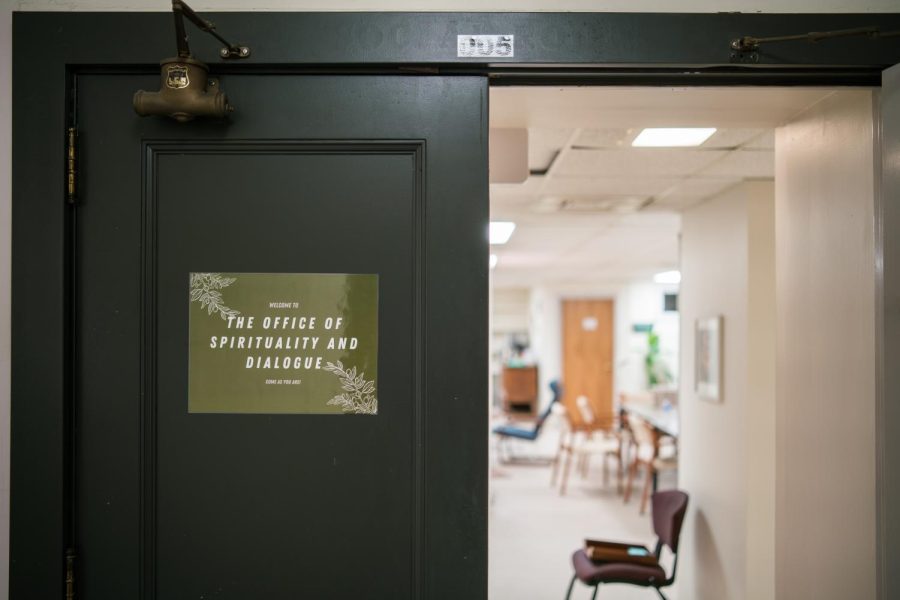Office of Spirituality and Dialogue New Approach to Religious Life Inadequate
The Office of Spirituality and Dialogue.
One skill I have gained from a liberal arts education is the ability to identify generalizations that obscure more complex realities. On March 3, The Oberlin Review published an article about the changes to the newly-renamed Office of Spirituality and Dialogue (“Office of Spirituality and Dialogue Implements Changes to Religious Life in Oberlin,” The Oberlin Review, March 3, 2023). I have been involved in religious life at Oberlin for all of my time here, yet I was shocked by these changes — and I was not the only one. I was therefore troubled by the presence of phrases throughout the article such as “promoting student voices” or “student- centric.” If my classmate were to use such general statements in a seminar, I would immediately ask: “Which students?” I would like to state for the record that the students referred to in the article certainly did not include me. After asking around my social circle, I troublingly couldn’t find anyone I know who it did include. It is concerning that my peers who have been consistently and publicly active in politically progressive Jewish religious life and Judeo-Islamic interfaith work at Oberlin — some, like me, for the last four years — were not contacted nor included in whatever formal or informal evaluation process may have occurred.
This structural reorganization of the OSD without any prior public notification of evaluation, a formal committee, or clarification of which students were consulted and when is highly unusual in the context of my knowledge of the Office’s recent history. As a history senior project, I am writing a short history of Jewish student life at Oberlin, including its relationship with the OSD. I would like to make a comparison between the present reorganization of the OSD and what was arguably a smaller reorganization: former President Nancy Dye’s 1995 Ad Hoc Committee on the Jewish Chaplaincy. According to archival records, President Dye created this committee to study and give recommendations regarding the Jewish chaplain position. This committee, composed of publicly-named individuals, held “22 meetings with groups and individuals,” “invited and received a good deal of mail” from current students and alumni, and submitted “a lengthy and detailed report” of its findings to President Dye. This report and committee illustrate that Oberlin had formal, public channels of evaluation and institutional recommendations for the religious life in the College. Current students and alumni deserve that same transparency and accountability.
The Review article states that “OSD has been moving away from community religious leadership and chaplains to focus on highlighting student voices and religious perspectives.” OSD, during my time at Oberlin, never aided in the community religious leadership I was involved in. For instance, it did not help when the Oberlin College Hillel board was informed right before reading period in the spring semester of 2022 that we would have to move out of our room, Wilder 216. I wish I could provide a more personal perspective of the Office before the changes occurred. However, considering I took two academic incompletes in spring 2022 to preserve and care for Jewish life on campus, my experience is that the OSD has been woefully unengaged with the needs of Jewish students for a long time. Its change of name seems to affirm that it does not value specific religious needs.
There used to be a student-centered, multifaith space on campus: Kosher Halal Co-op. Despite its current inactive status, KHC remains extremely important to me. Its shutdown felt to me like the College did not support or value what truly was a student-centered, student-run community.
Frankly, Cleveland Hillel Foundation staff and Oberlin alumni have been the source of my religious support for the last four years. When I encountered a lack of kosher-for-Passover meals in DeCafé last spring while Talcott Hall was closed, Oberlin College Hillel made sure I had something to eat. This year, OSD was able to find funding to cover the cost of a Judeo-Islamic interfaith kosher-for-Passover and Halal Iftar meal that I hosted at my home Sunday, April 9. I hope I provided a space for Muslim students on campus to break their fasts with home-cooked food in a pop-up interfaith community — similar to the home I found as a first-year within KHC. I am very appreciative of OSD’s help in this area and have hope that this may be the beginning of positive change. But without recognition that religious students often require specific resources and have needs unable to be fulfilled by a universalist approach, real change cannot occur.
Considering that Jewish students are estimated to constitute about 20 to 30 percent of Oberlin’s student body and Jewish religious groups are some of the most active religious groups on campus, I am puzzled that there is no pluralistic individual with advanced knowledge of Jewish practice who has been hired by OSD to support such a large, active, and diverse community. I have been a leader of that “student-centric” and “student-led” community, and without KHC and a full-time Hillel rabbi, it has been an increasingly lonely and burdensome title to bear.


